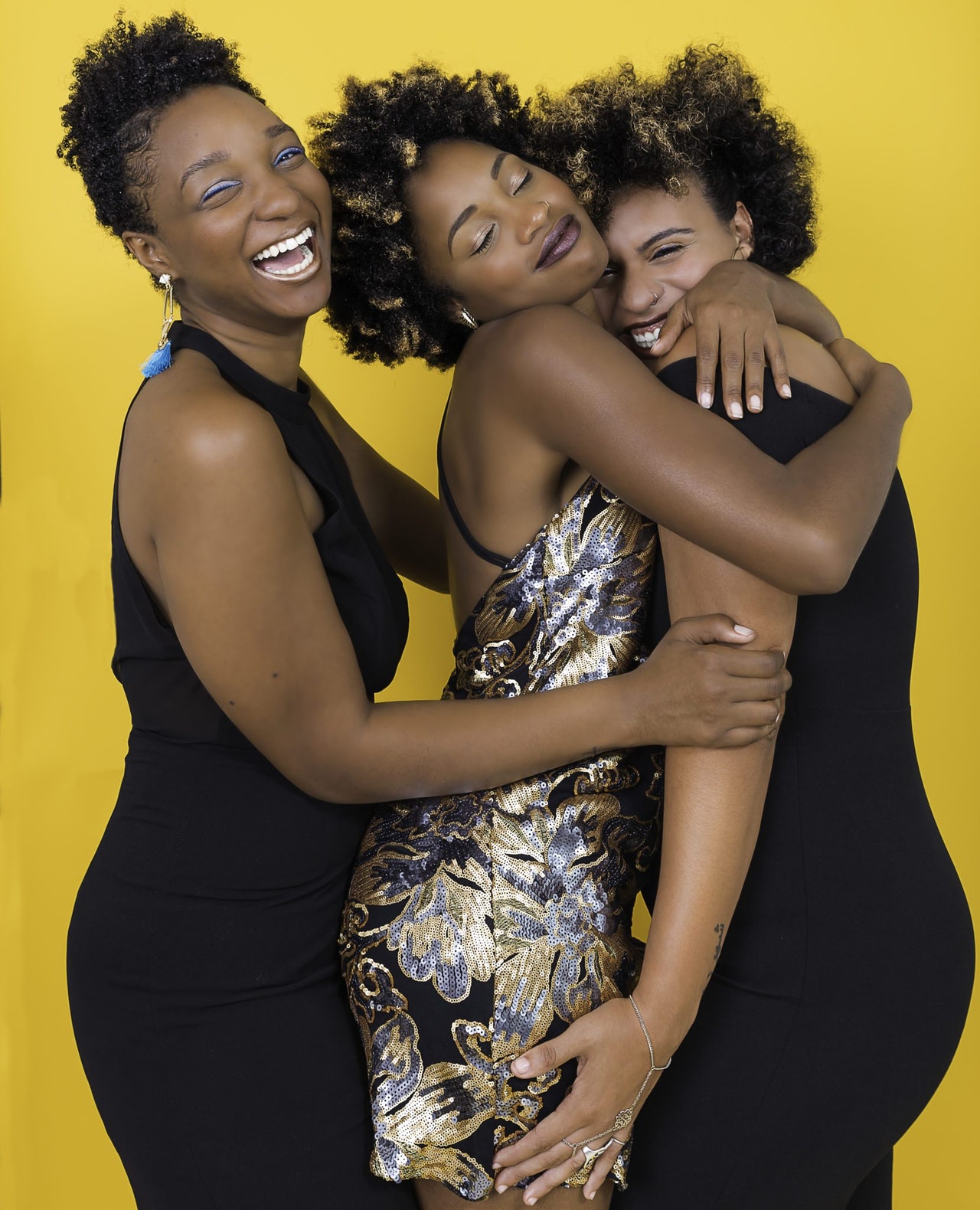Features
Ariyike Olayiwola: This Friendship, May Algorithm Not Put Asunder
We are not objects, we are persons. We feel, sense, we shouldn’t alter that. It’s not a flaw. A beautiful, relatable post or skit may be satisfying, but wouldn’t beat getting a hug, a pat on the head or shoulder, a warm smile, and listening to another’s voice.

It started with an ordinary throwback picture. Not the time-worn ones that make you howl at the sight of them, it is those closest to recent civilization I refer to. You know, the ones that saw the dawn of pouting in pictures, where our poses evolved with more creativity and originality than the signature hand-on-the-hip pose, with camera phones that did well to give fair descriptive features of you? Those!
Even those are hilarious, seeing how thoroughly invested you were in expressing the fashion and glam trends that are now passé. It may be embarrassing to see an unrefined version of you, but therein lies its fun.
This picture of mine felt no different, as I crackled at the fuzzy details of the picture, scoffed at the artless duck face I and my friend managed to make, and at some point, wanted to shrink in shame upon noticing the weird positioning of my tummy belt – why was it reaching towards my chest again?
Amid these feelings though, was the admiration that seized my heart for those two people in the picture: our lives were less complicated.
The sincerity of our laughter was borne of contentment. We understood that happiness isn’t a prize we had to pick up at the end of a grand event, it’s rather an interminable free event waiting on us to participate. And why wouldn’t we? We were students, we loved freebies.
There was also this genuineness in the expression of self, however simple, fearing no judgement. Even sharing on social media had us at ease; however we appeared, we were sure to get spatters of thumbs-ups. It was nice experiencing the virtual world pre the culture of performative perfection.
The endearment of it all was the strong bond between us that reflected through our locked hands. We didn’t plan to lock hands, I remember. One of the photographers had expressed his shock at the uniqueness of our friendship – she, a hijabi, and I, not. It wasn’t the first time, so we turned to each other, giving our signature facial expression to such comments, chuckled with our hands gliding over each other, tried out the silly duck face, and like that! We were picture ready.
It was an “I got you anytime” kind of locked hands. And the picture screamed “girls for life!” Except that was transient. Our bond splintered at the impact of a huge wedge of silence after graduation. It was too quick and rather cold. No words, no questions, no closure – just silence. Our interaction went from an everyday ritual to a once-in-a-year happy birthday post which was as genuine as our celebratory Snapchat pictures.
But this picture post struck a chord. It engendered a moment of reflection that launched us into a well of beautiful memories, and then some. She remembered the details of all activities we had together as well as I did, our values still aligned, and the best part was how we enjoyed each other’s company, we didn’t want that moment to end. It felt like the last three years didn’t happen.
So when she asked, “what happened to us?” I went in a daze. Indeed, what happened to us? I’m usually equivocal in tense situations like that, so I answered, “Life?” Of course, that wouldn’t do, so we resolved to bare it all, and In-between the sweet, sour, and utterly bitter talks, we figured it out: assumptions.
We grew apart based on our assumptions of each other. She assumed I had outgrown her, and I assumed she had become incapable of tending to me and my problems. Ridiculous! How do you sever a friendship based on assumptions? Don’t answer that, except you are an introvert with an unrelenting penchant for overthinking.
I wouldn’t have minded leading advocacy to ban the relationship between two over-thinkers, with the annoyance that welled up in me upon realisation. However, our discovery also hinted that our actions leaned on strong influences.
Mental fatigue stood as one: we were just tired. The myth that young people cannot have it tough, is just that – a myth. We have it just as tough. The onset of adulthood – this phase of freedom, but also accountability – is as daunting as its excitement. It calls for introspection, a rather onerous exercise needed to shape your personality. But, simultaneously, you find yourself in an age where your validation as a person hinges on your financial worth, in an environment with limited opportunities, and surrounded by the unending struggle of those before you to fulfil this obtrusive validation. Working through all that can be chaotic. Add that to being a female condemned to a society-fashioned biological clock, and a fear of an alarm that never goes away. You become overwhelmed with the pressure, and it takes a toll on your mental health. Not necessarily to a self-destructing mode, but stringent enough to put you in a survival mode, where you are left with no more mental energy than what is needed for you to get by each day.
That was the origin, the first hit from the wedge of silence that left us staggering away from mutual trust so much that we failed to discern social media’s influence on reality.
It was the progressive age of social media and there was a hype of alternative ideas – dress sense, opinions, reality – and we were impressionable. In my case, my social media posts highlighted only the positives happening to and around me because, to be honest, no one seemed like they would care to know about how my heart sank at the many punches I was getting from life. It probably was their reality too and social media was presenting an escape from such reality. I needed those moments of escape too, however evanescent, they assured me I wasn’t totally a dud.
She, on the other hand, was surrounded by individuals who put themselves first, so much to her detriment, and in her words, “I felt used and left out, so I needed to empower myself.” That explained her acclamation for ideas that challenged the yieldless conventionalities surrounding collectivism. Some of which garnered applause were the “all man for himself” and “return the energy” approaches, which seemed to be more of a response to the overbearing classism many had subscribed to, than the actual tending to one’s self.
And, in the quest to satisfy our needs, we both swayed into the comfort of our respective needs-likes on social media, extensively leading to the distortion of each other’s image. From her view, I looked like one of those who had subscribed to premium classism. From mine, she looked like someone who didn’t have an extra hoot to spare for someone else, whereas, in reality, we were just two tired young adults handling frustration differently.
“What a shame!”
“Algorithms put a wall between us?” We both yelled respectively upon realisation.
This was followed by laughter that nearly collapsed our lungs. Oh! How silly we felt falling for something that intangible.
I spent some time after, ruminating on our conversation, and as much as I believe distance, overthinking, and a lirru ego added to the weight of the silence, I could not but notice how powerful social media is in the shaping of relationships. And, thanks to the frequency illusion, everywhere I looked, everything I heard, proved this awareness valid. There is a shift from having physical friends to belonging to a social media tribe or solitude, and it is worrisome.
Social media’s essence in providing an alternate world where we get to live our fantasies would have been such a delightful one if we weren’t further segregated based on our respective fantasies. Or, maybe it is us who get so engrossed dwelling in this realm, we forget we are real persons in a real-world, where our functionality is largely dependent on human (mostly physical) interactions. So, we replace going out and talking with friends with checking their latest posts. We miss out on facial and body expressions that give meanings to conversations and replace it with postured texts or images we project meanings on. Or, we replace getting comfort under the warmth of a friend/family with inserting ourselves into a relatable post made by a stranger. This isn’t bad, but what this shows is how we have miniaturised ourselves into objects. And like objects, we start to lose feelings and a sense of real connections.
We are not objects, we are persons. We feel, sense, we shouldn’t alter that. It’s not a flaw. A beautiful, relatable post or skit may be satisfying, but wouldn’t beat getting a hug, a pat on the head or shoulder, a warm smile, and listening to another’s voice.
And so I learned from one throwback picture that the essence of friendship and physical interaction is gratifying and shouldn’t be vitiated with this new sensation, nor should it be ceased by ego.
My take on friendship in this age is simple: check on your friends, things aren’t always black and white.
***
Featured Image: Pexels





















